‘Consumers are not aware we are slaves inside the greenhouses’
Exploitation plagues Spain’s farming province, with migrant workers paid below minimum wage and living in squalor.
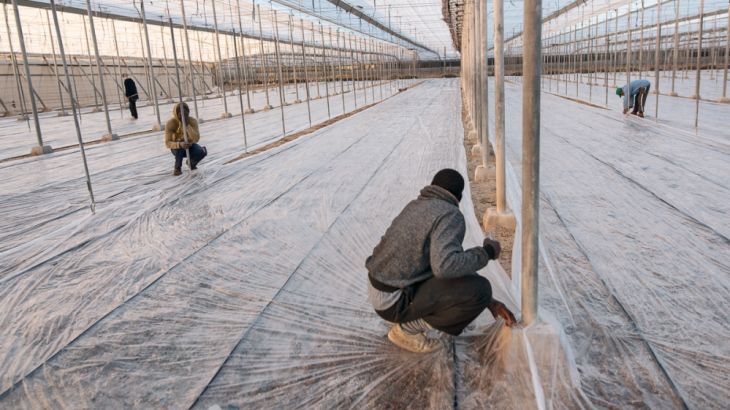
Almeria, Spain – Maruf Osman, a 23-year-old Ghanaian, gestures towards the slum-like cement and tarpaulin settlement behind him, set on an arid patch of wasteland outside the small town of San Isidro in Almeria, Spain’s southern province that hosts the world’s largest concentration of greenhouses.
“Even in my country,” he says, “I never lived in a place like this.”
Keep reading
list of 4 itemsWhy are Pakistan’s wheat farmers protesting against the government?
About 282 million people faced acute hunger last year: UN-led report
The legendary flavoured ground salt from India: Pisyu loon
A stench hangs in the air; there is used toilet paper on the floor, waste and shredded plastic.
Stray kittens dart around in the refuse.
In the near distance, a migrant in a Liverpool FC shirt squats behind a bush.
On either side of the settlement, the milky-white expanse of Almeria’s fruit and vegetable greenhouses dominates the landscape – from the foothills of the Sierra Nevada to the Mediterranean Sea.
Covering over 31,000 hectares (76,600 acres) and visible from space, Almeria’s “sea of plastic” produces roughly 3.5 million tonnes of fruit and vegetables per year.
According to regional distribution company Agrosol, 61 percent of Almeria’s produce is exported, with 99.8 percent bound for Europe – the Netherlands (13.55 percent), France (13.5 percent) and the UK (11.4 percent) are top markets.
With Brexit looming, farmers are preparing for high UK import taxes, pushing production costs higher and produce prices down in a speculative commodities market generating an annual revenue of 274 million euro ($300m).
Viewed from above, the striking geometry of Almeria’s greenhouses resembles a work of science fiction: a sprawling, futuristic farming model of structural symmetry cultivating produce by the metric tonne in a land where water is scarce, the earth scorched and the sun blinding.
In reality, what is referred to as Almeria’s “economic miracle” among Spanish economists is almost exclusively dependant on an invisible, expendable and often illegally employed migrant workers like Maruf, toiling under 40-degree heat and extreme humidity.
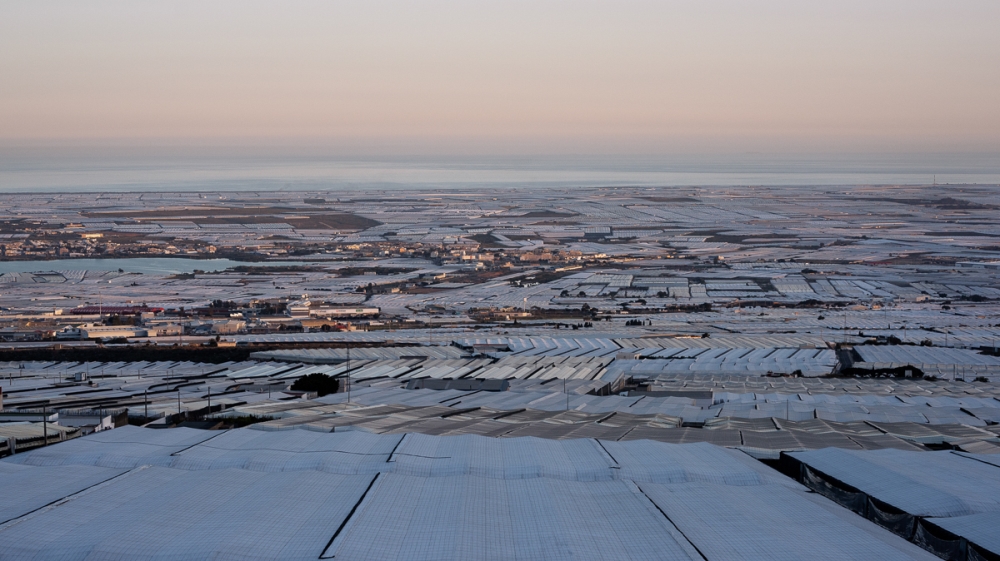
On the days he finds work, Maruf spends eight hours waist-deep in pesticide-covered crops without protective gear.
At night, he sleeps body-to-body in crowded rooms, like the thousands of other migrant workers crammed into grim encampments like San Isidro dotted throughout the region, without electricity or sanitation.
Maruf arrived in Almeria six months ago after reaching Europe by boat via Lampedusa. With few job opportunities in Italy, he travelled overland to Valencia to harvest oranges, then to Almeria seeking work in the greenhouses.
Here, he lives in a concrete structure without doors or windows that he shares with five others.
At best, he finds work one or two days a week during harvest season.
When his parents in Ghana call, he feels ashamed and lies about life in Europe.
“I don’t want them to see me in an environment like this,” he says. “They will cry. They will say ‘why are you living like that?'”
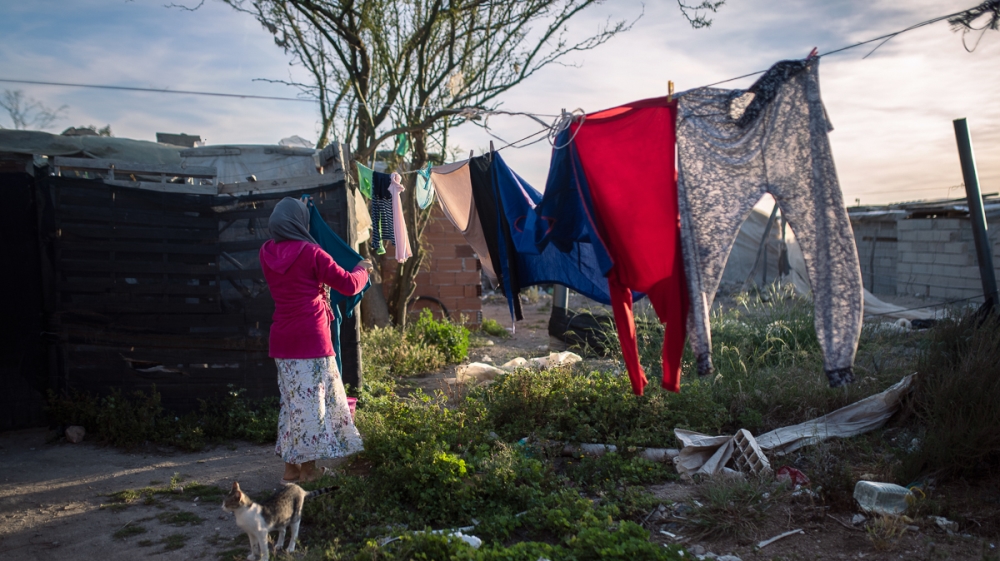
As he speaks, two more Ghanaians emerge from a concrete outbuilding.
They wash their arms from a blackened pot hung over a campfire. Dipping a tin mug into the pot, they share sips of water.
On a nearby greenhouse, someone has graffitied “rights for the workers” in Spanish.
A Moroccan child wanders alone across the wasteland, alongside a pile of smashed bottles. Nearby, a migrant sways back and forth – he appears to be drunk.
“We have a lot of problems with alcoholism here,” says Jose Garcia of the Sindicato de Obreros del Campo (SOC-SAT), an independent Almeria workers’ union and pressure group which offers legal advice to migrants and battles local agricultural companies for baseline worker salaries and safety protocols.
“Boredom, depression, it takes its toll,” he says, looking at the man, who is now propped against a tree.
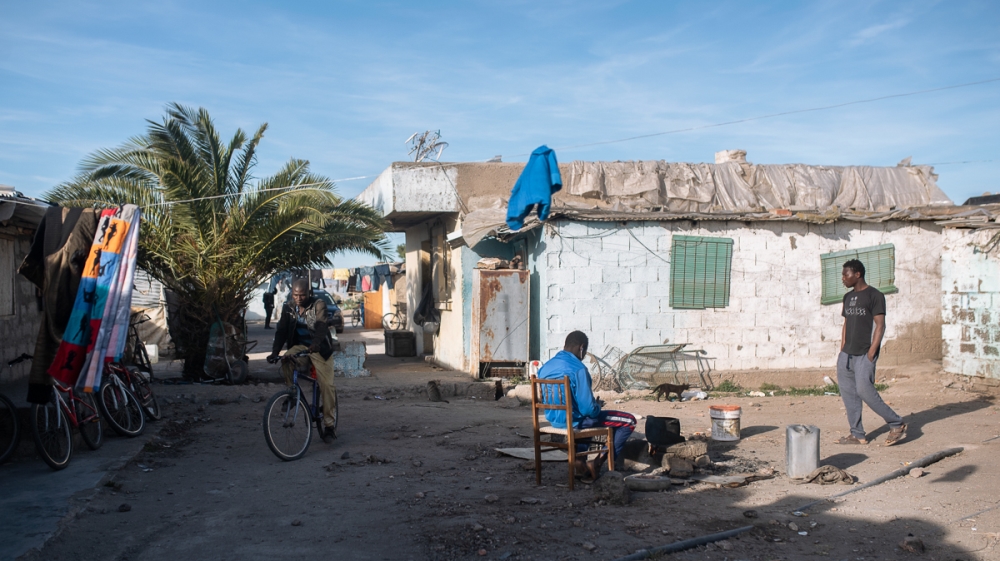
According to Garcia, there are roughly 300 inhabitants in the San Isidro camp – including five children – with 62 similar settlements across the region.
“We estimate that there may be around 100,000 workers in the field … 93 percent of farm workers – salaried workers – are in precarious conditions.”
In 2013, the SOC negotiated a minimum daily wage of 46.72 euros ($51.21) for workers. But greenhouse owners have still not put it into effect.
Un-contracted employment is, by law, illegal here.
But Almeria’s labour force and migrants are often employed unofficially, paid cash in hand on an ad-hoc basis for approximately 35 euros ($38.36) a day.
“There is a lot of suffering here,” says 23-year-old Moroccan Abdul Wahjid, another camp resident. “We would like to live in another place, but we don’t have [work] papers – a permit – and we don’t have money to move.”
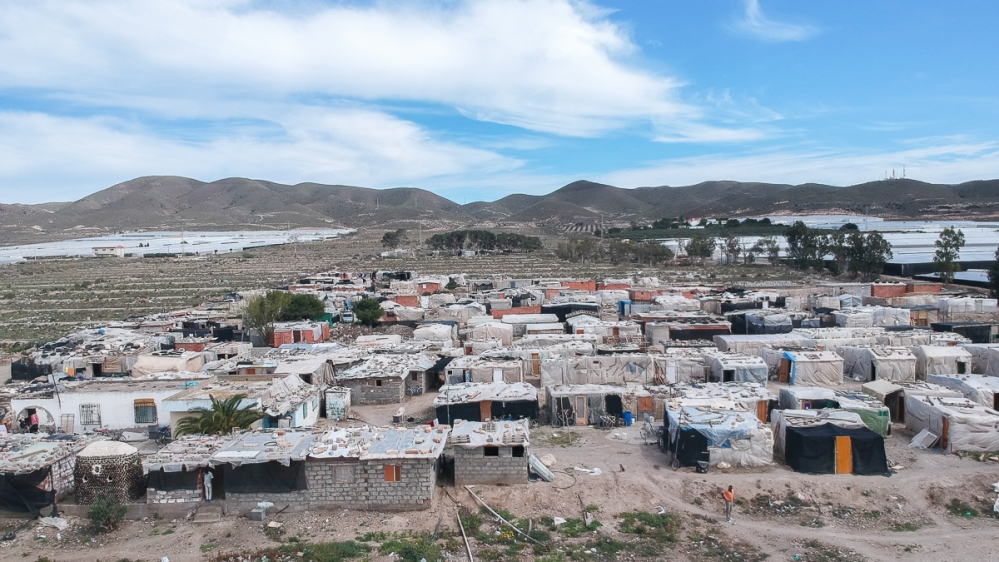
A spokesperson from the Spanish Ministry of Agriculture, Fisheries and Food told Al Jazeera that the government implements health and safety regulations and carries out regular labour inspections.
Irregularities should be reported, though “some isolated case cannot be considered”, the spokesperson said.
Regarding the use of pesticides, the ministry said that by law, safety standards must be met and protective gear should be worn when working with chemicals.
But little evidence of this law can be seen in the region.
The Spanish government’s approval to raise the minimum wage by 22.3 percent for 2019 is also said to benefit roughly 2.5 million workers from all sectors – including the agricultural industry – and help “prevent poverty at work, increase the living standards of the lowest-paid people”, the spokesperson said.
Yet, this still does not address Almeria’s use of undocumented migrant labourers who are paid below minimum wage or the squalid conditions in which many greenhouse workers live.
Consumers are not aware that we are slaves inside the greenhouse.
The route to legal employment is tough.
One man intimate with the process is Spitou Mendy, a 56-year old Senegalese SOC union chairman, translator and greenhouse worker.
Originally a school teacher heavily involved in union coordination in Senegal, he arrived in Almeria in 2001.
Today, he lives alone in a small, sparsely furnished apartment in the city. It is late afternoon and he has just finished his greenhouse shift.
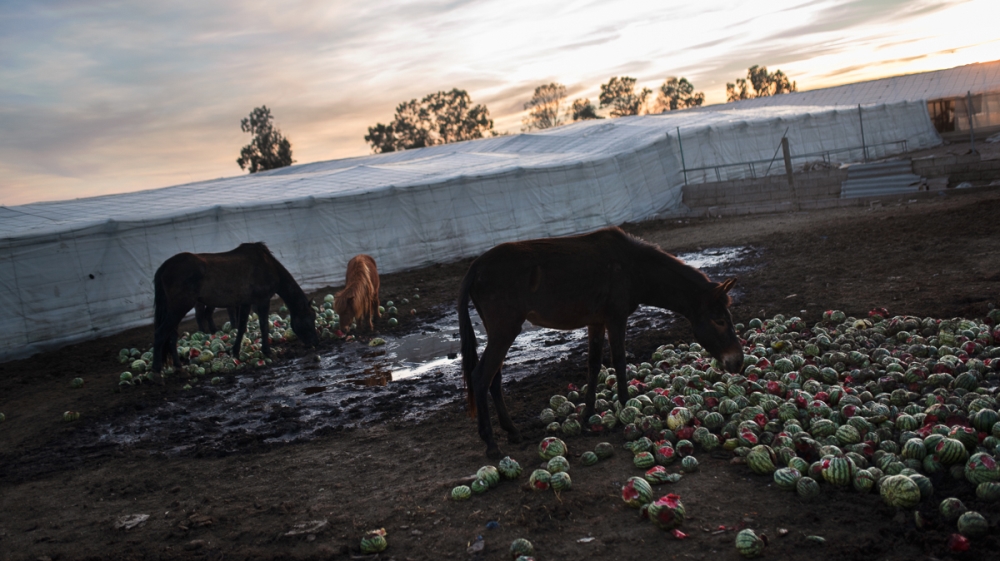
Rubbing his tired eyes, he pulls down his living room blinds, blocking the sun outside.
“When [a] migrant arrives to Spain, he has to wait three years to apply for a work permit,” he explains. “Outside of that permit there is nothing, they are not visible. [Workers are] like an object that has to be hidden.”
This waiting period is called “Social Roots” and is designed to prove to immigration authorities that the individual has begun building a life in Spain with a view to settle permanently.
Legal employment also requires pre-work permit sponsorship from a willing company boss.
“[Migrants] take a high risk because if something happens in the greenhouse while they are working they have no access to [the] healthcare system.
“They can [also] be really in trouble, because they are not legally [supposed to be] working.
“We are exposed to risks such as pesticides. We breathe the products that are used to kill the bugs in the greenhouse. We have no one to tell us: ‘This is dangerous for you.’
“People are afraid, but they’re more afraid of the bosses firing them.
“People die inside the greenhouse because they have no protection … In the end, the worker is sacrificed so that a well-packaged product reaches the supermarkets.”
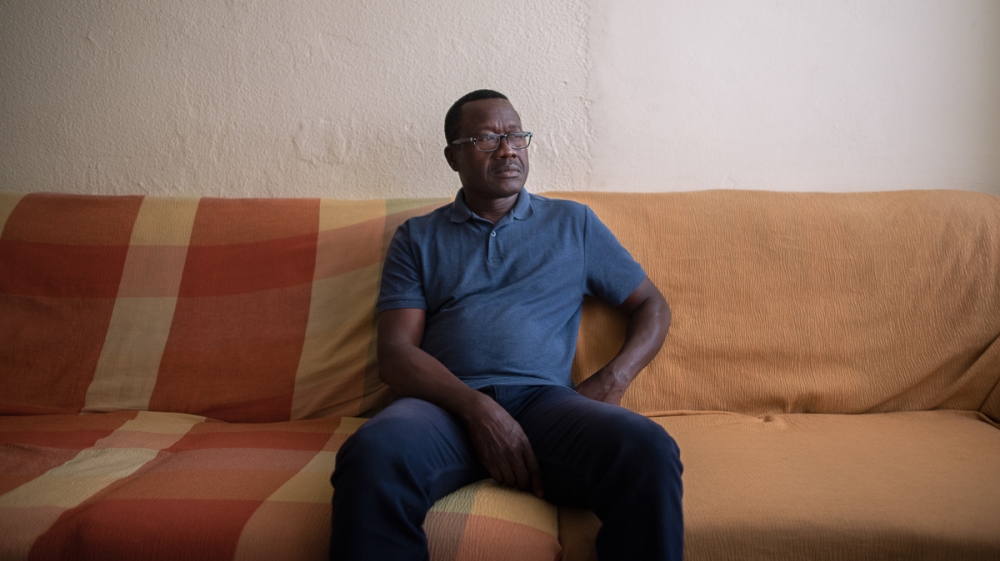
An independent study in anticholinesterase pesticide poisoning in Almeria by the University of Grenada’s Department of Legal Medicine and Toxicology revealed 597 counts of pesticide exposure between January 2000 and December 2006.
Exact figures for the number of people who have died of work-related conditions are not available but SOC has helped to bring a recent case to light.
A 27-year-old Moroccan worker identified as MEB died on January 18, 2019, after a week with stomach pains.
An autopsy performed by the Institute of Legal Medicine (IML) of Almeria confirmed his death was due to poisoning.
Greenhouse owners Kop Agro refused to comment at the time, citing a lack of information at the time of his death, and have issued no statement since.
For un-contracted migrants seeking work, their day begins around 4am.
It is dark in the small town of Las Norias De Daza. Along its main street, shops and bars are bolted shut. A cold wind hammers inland from the coast.
Small groups of Moroccans and West Africans in high visibility jackets gather at roundabouts and street corners as small white vans and cars crawl by. They squeeze quickly inside the vehicles, vanishing into the crisscross of roads and tracts leading towards the greenhouses.
Several migrant workers Al Jazeera interviewed said they do not see the bosses they work for, only duty managers who pick them up, oversee the day’s tasks, then return them to the same spot.
Managers also rarely hire new people, favouring small groups they have prior experience with.
For newcomers to Almeria, this may mean weeks – or months – of doing nothing.
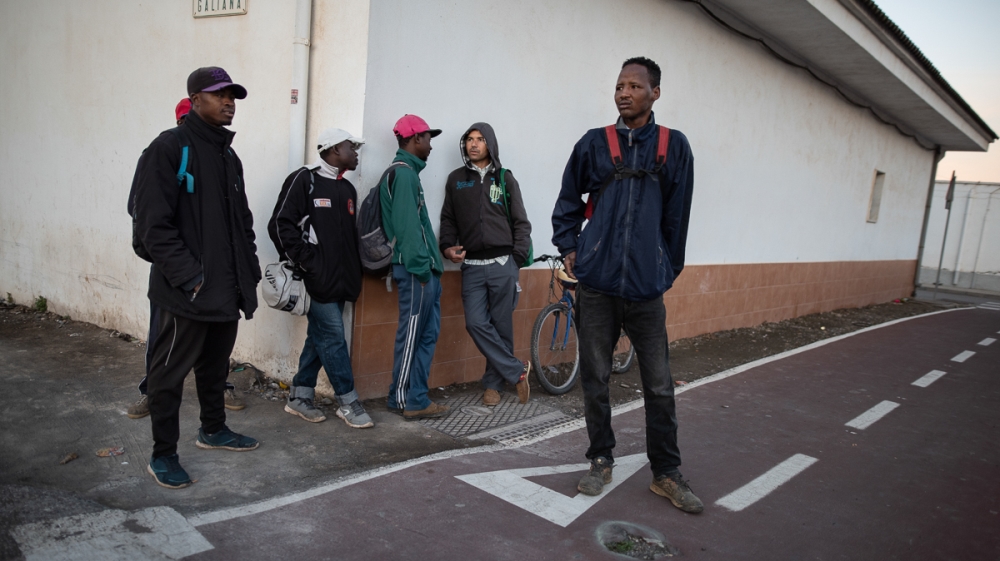
By 9:30am, La Mojonera, another sleepy coastal town, stutters to life.
A group of young men from Mali and Ivory Coast have lingered well past sunrise at its main roundabout, hoping for work.
Soon, they call it a day, trudging back to their rented accommodation: a windowless three-room apartment shared by 10 people, with cracked walls and a heavy steel door opposite a pesticide production plant.
Inside, the air is stagnant.
The men are exhausted. They slump on tatty sofas and chairs as a television blares a pixelated football match, the picture stuttering and stalling.
As midday approaches, others appear, bleary-eyed and dazed.
Daouda Diabete, 24, from Ivory Coast reached Almeria four months ago from Italy.
He is smartly dressed, with perfectly white trainers, and shifts nervously on the sofa as he speaks.
“There are bosses who might give you two or three days’ work with no papers, it depends. But after, they let you go.
“If you have papers you can receive a small contract and that way you can manage. You wake up 4am and you go and look for work. You mustn’t just stay at home – if you stay at home, you don’t get work.”
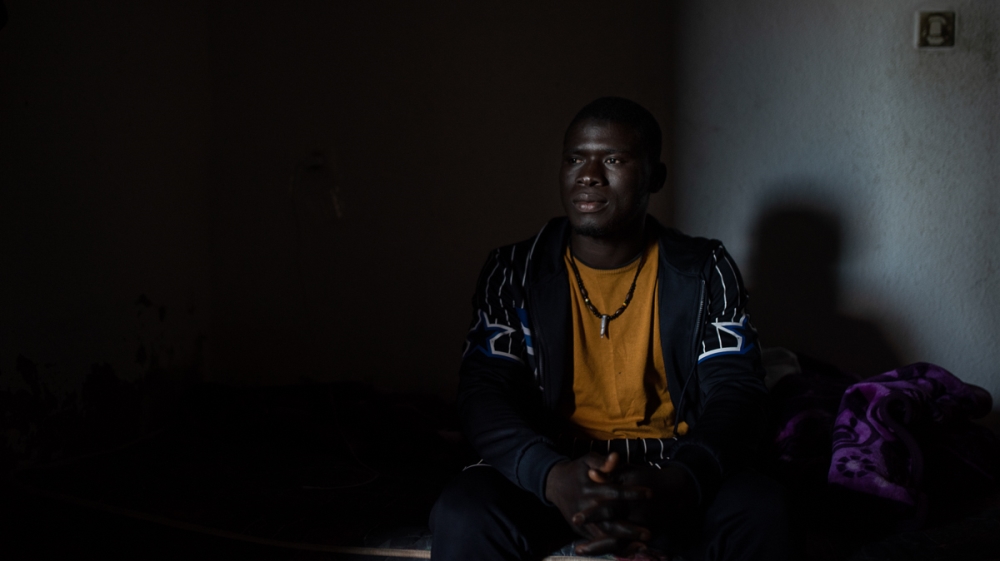
Martin Caraher, professor of food and health policy at City University, London, said workers like Diabete are “doubly vulnerable”.
“They’re vulnerable because of low wages [and] they’re vulnerable because they’re migrants.
“People in the UK are not even aware of this. People at the moment are largely hung up on sustainability – quite rightly. But for certain products such as coffee, they’ve got some sense of fairness in the food chain and they assume that for the rest of it, it’s ok. But it’s not.”
As well as the migrant workers, life is also unpredictable for some of Almeria’s farmers.
Avelino Mana, 56, has owned his greenhouse for 30 years, 23 of which he spent farming courgettes.
It is harvest time and his entire crop is bound for England via export and distribution company Mayes Exportation, which supplies UK supermarket Sainsbury’s.
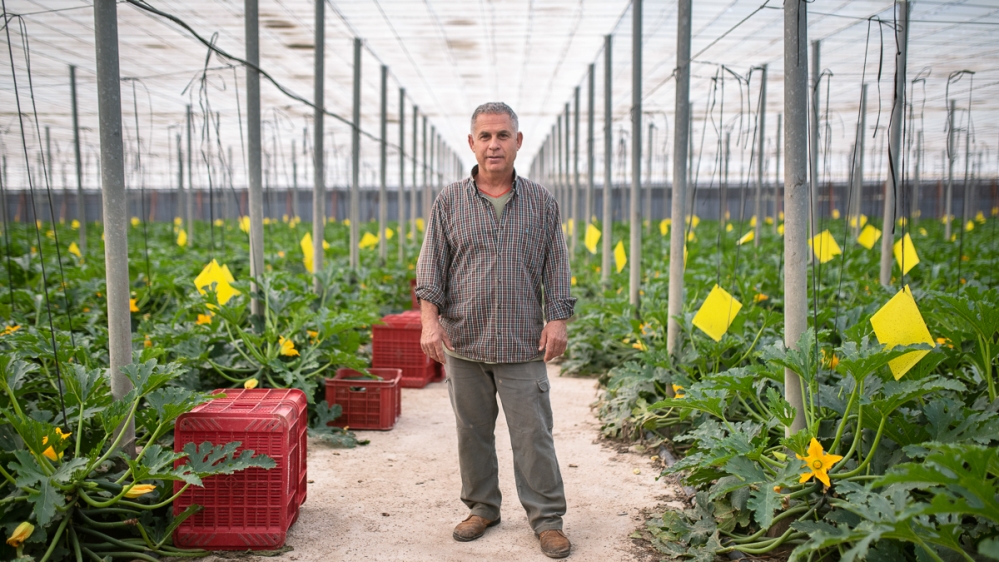
Inside his vast greenhouse, the air is heavy.
Dense vegetation rises to waist height, covering 30,000 square metres (323,000 square feet).
Despite its size, Mana says his three contracted Moroccan employees – one of whom has worked for him for 22 years, and himself, are all the workers his operation needs.
Gradually rising production costs have hit his business hard and Brexit is set to impact him further, though he cannot say to what extent.
Mayes, the distribution company, “already told us that they are going to import less courgettes. They told me that the transport to England is going to be more expensive,” he explains.
“The thing is, the costs like plastic, soil, workers, the lights – everything is more expensive. But the price of the products remains the same as 30 years ago.”
Mana never knows exactly how much his crop will sell for. Prices are dictated by Almeria’s six major distribution companies, which purchase produce per kilo from local suppliers.

Then they sell them onward to the supermarkets, often providing the transport and logistics required for them to reach European shop shelves.
Distributors’ profit margins, when squeezed by rising logistical costs, push produce prices down. But without these companies, most struggling greenhouse owners do not have the capital or facilities needed to go it alone.
“They have us by the balls,” Mana says, scoffing.
Currently, his courgettes are purchased by Mayes for approximately 35 euro cents per kilo ($0.38). In a UK supermarket, they will sell for roughly 1 euro ($1.10) each, equalling around 8 euro ($8.79) per kilo.
“It’s a fair price for a good product,” says Mana. Though he will never see it.
At the entrance to his greenhouse, a Mayes minivan sits waiting to be filled.
Inside, Mana and his workers go from crop to crop, slicing courgettes from their stalks with boxcutters and loading them onto hand-pushed trolleys.
In the nearby town of El Ejido, on the highway connecting Almeria to Spain’s North, there are warehouses for many of the region’s major distribution companies: Gongora Export S L, Gonzalez Bonilla S L, Ica, Mr Roger, Agroponiente and La Union.
All six of Almeria’s main distribution companies declined to be interviewed for this article.
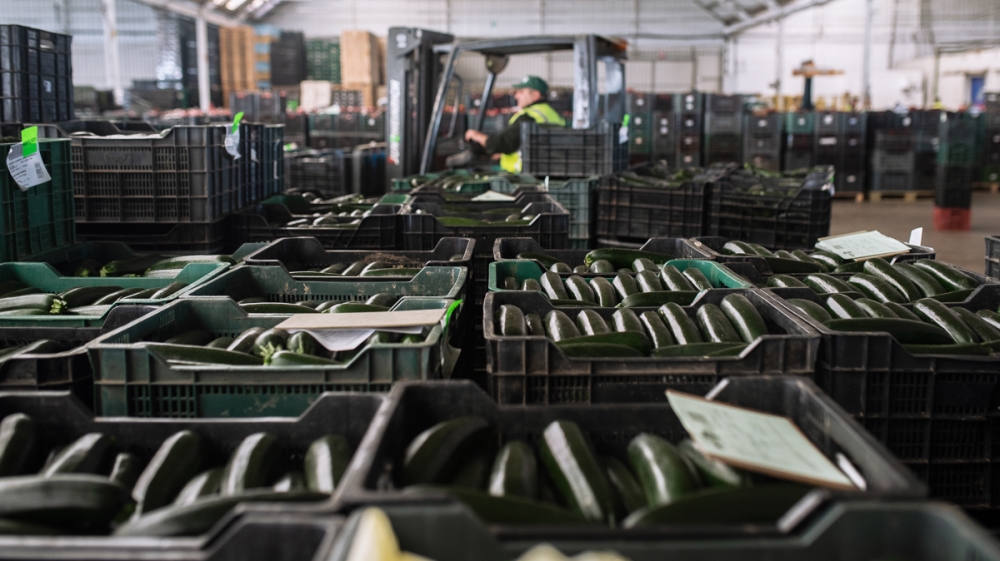
La Union’s warehouse is a hive of industry: sterile, fast-moving and a world away from the bleak living conditions of Almeria’s migrant workers.
Machinery clanks and grinds as forklift trucks zip back and forth over the warehouse floor.
Uniformed Spanish workers shout directions as shiny crates of tomatoes, peppers, courgettes and melon are loaded onto lorries lining the entrance bay.
More than 2,200km (1,370 miles) away, on the vegetable aisle of a Sainsbury’s supermarket on London’s Kingsland Road, crates of courgettes separated into green mesh bags sit full to the brim as rush hour shoppers fill their baskets.
On each bag, the label states: “Grown by Mayes, Spain.”
Almerian products on adjacent aisles also merely state the country and region in which they were grown.
There is no mention of the ailing, independent greenhouses like Mana’s that they were purchased from at rock bottom prices.
All trace of the region’s impoverished migrant workforce, and the squalid settlements in which they sleep, have been washed clean.
A spokesperson from Sainsbury’s did not address why produce labels do not note the exact point of origin, but told Al Jazeera that since 2015, the company and other retailers have funded and supported the Spanish Ethical Trade Supplier Forums.
Sainsbury’s teams visit suppliers every few weeks to monitor how they meet the principles of the company’s code of conduct for ethical trade, the spokesperson added.
“[Suppliers] must also show continuous improvement in worker welfare and report their progress to us in delivering against their own code of conduct.”
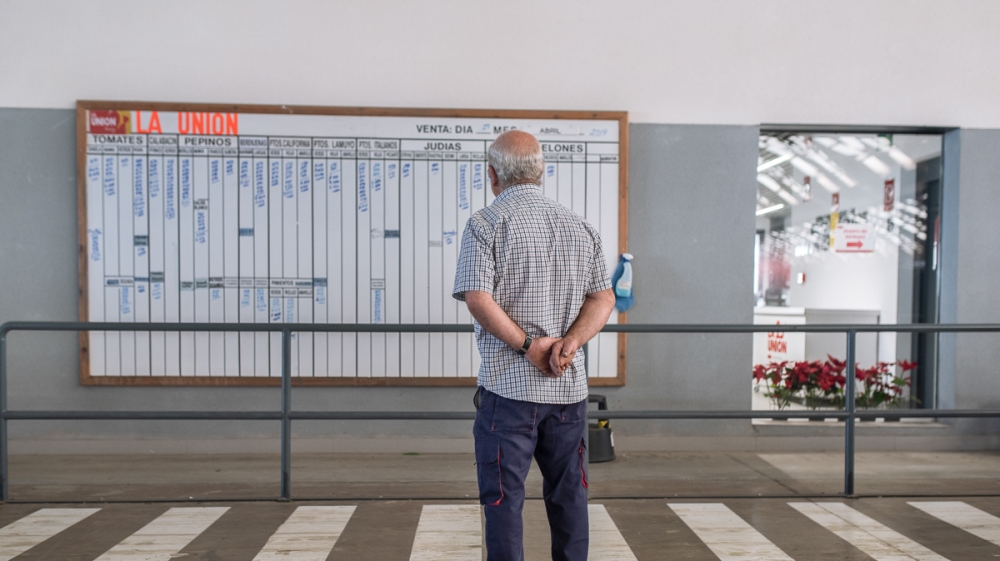
British supermarkets remain largely opaque regarding import volumes, product origins, incomes and market distribution strategies.
Tesco has declared this “commercially sensitive information.”
Sainsbury’s drew fire from UK regulatory body The Financial Reporting Council in 2015 for refusing to declare supplier income.
A Tesco spokesperson said the company was “aware of the risks surrounding the employment of migrant workers in southern Spain”, but works with growers, suppliers and the Spanish Ethical Trade Supplier Forums to ensure “good standards.”
The spokesperson added that Tesco uses an approved supplier list, which is annually audited by “independent parties”, and conducts regular visits to supplier sites.
However, Tesco also omits specific supplier information on labels, meaning conscious consumers cannot make informed decisions about purchases.
This lack of transparency as produce passes from greenhouse to table is, according to Spitou Mendy, the Senegalese union leader, essential to the success of the distributor companies.
They have come to define Almeria’s economic model as well as the continued prosperity of the supermarkets they supply.
“Consumers are not aware,” he says, “that we are slaves inside the greenhouse.”